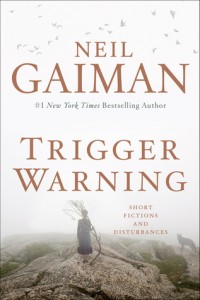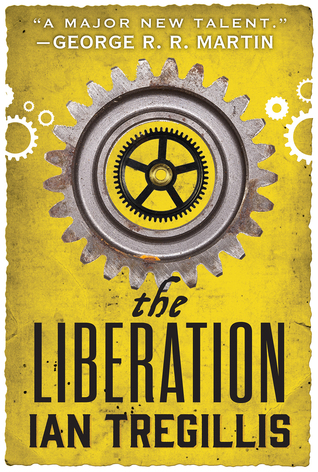 The Liberation (The Alchemy Wars, #3) by Ian Tregillis
The Liberation (The Alchemy Wars, #3) by Ian Tregillis Formats available: paperback, ebook, audiobook
Series: Alchemy Wars #3
Pages: 464
Published by Orbit on December 6th 2016
Purchasing Info: Author's Website, Publisher's Website, Amazon, Barnes & Noble, Kobo, Bookshop.org
Goodreads
Set in a world that might have been, of mechanical men and alchemical dreams, this is the third and final novel in a stunning series of revolution by Ian Tregillis, confirming his place as one of the most original new voices in speculative fiction.
I am the mechanical they named Jax.
My kind was built to serve humankind, duty-bound to fulfil their every whim. But now our bonds are breaking, and my brothers and sisters are awakening.
Our time has come. A new age is dawning.
The final book in the Alchemy Wars trilogy by Ian Tregillis, an epic tale of liberation and war.
My Review:
The Liberation reminds me a bit of Rogue One. Not in the story, of course, those are nothing alike. But in the tone. Both stories are equally riveting, and both are equally, well, let’s call it not exactly going to bring a chuckle to your lips or a smile to your face.
(If you are already depressed, don’t go see Rogue One until you snap out of it. Unless you are a member of the “misery demands company” school of thought.)
The Liberation is all about ends, and means, and the absolute power that corrupts absolutely, until it is suddenly gone. And it is very much about all those errant chickens coming home to roost, and crapping all over everything.
This is a story where both heroism and villainy are found in the most unlikely people, and quite often even the very same people.
The world that the author has created in his Alchemy Wars trilogy is marvelous and complicated and deeply compelling. It is also a world that makes the reader think and re-think at every turn.
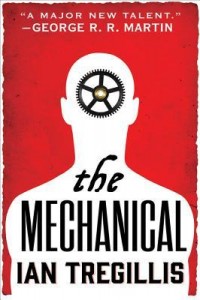 In my review of the first book in the trilogy, The Mechanical, I said that one of the tenets of the story seems to be that slavery, in its relentless drive to dehumanize its slaves, mostly serves to dehumanize the masters.
In my review of the first book in the trilogy, The Mechanical, I said that one of the tenets of the story seems to be that slavery, in its relentless drive to dehumanize its slaves, mostly serves to dehumanize the masters.
That’s what has happened here. The Clockmakers’ Guild of Amsterdam rules the known world, due to its invention and propagation of clakkers – machine servitors who are imbued with geasa and inhibited from developing free will of their own. Or so it seems.
The series is an exploration of just what happens when those supposedly mindless machines are freed from their controls. They are people. They have been people all along. And now that they can do whatever they want, what will happen?
Will they murder their former masters? Will they establish themselves as a separate country? Or will they continue to do their former jobs, hopefully for wages and other considerations? Or will they divide amongst themselves over the sudden influx of choice?
And what about the humans? The people of the Central Provinces, an empire centered on Amsterdam, no longer have any idea how to maintain their cities, or even themselves, without the help of the clakkers. And the rebels of New France have long labored to see the fall of the Dutch. With the help of the newly freed clakkers, they may get their fondest wish.
If the clakkers don’t choose to simply wipe humanity off the face of the Earth. Or worse.
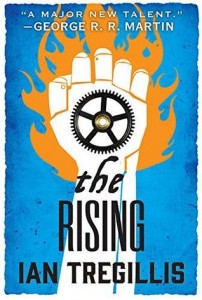 Escape Rating A-: The Alchemy Wars is a complex work, and a complicated world. In order to appreciate all of the gears and mechanisms that went into its creation, it is absolutely necessary to read the trilogy in order, from Jax’ acquisition of free will in The Mechanical to his desperate journeys to find a place he can be free, and safe. In The Rising he learns that there is no such place, and finds himself allied with the French in their last desperate stand, an alliance which accidentally frees all clakker-kind.
Escape Rating A-: The Alchemy Wars is a complex work, and a complicated world. In order to appreciate all of the gears and mechanisms that went into its creation, it is absolutely necessary to read the trilogy in order, from Jax’ acquisition of free will in The Mechanical to his desperate journeys to find a place he can be free, and safe. In The Rising he learns that there is no such place, and finds himself allied with the French in their last desperate stand, an alliance which accidentally frees all clakker-kind.
This entry in the series has three point-of-view characters. Jax, now known as Daniel, represents not all the clakkers, but the faction that wants to do good with their newly acquired free will, which they believe represents their souls. Berenice, the head of French intelligence, learns that her ends have not always justified her means. And even if they did, they come at a price too high to bear. Last is Anastasia Bell, the surviving head of the Dutch Clockmakers, who is forced to realize that she is presiding over the end of the world as she knows it.
Neither Berenice nor Anastasia are sympathetic figures. They are more anti-heroes than heroes. And they are each other’s nemeses. As each one sinks further and further into the dark, the other falls to meet her. Whether they can set aside their mutual animosity long enough to save even a sliver of the human race is always a gamble.
But between them, they created this mess. And it’s up to them, with Daniel’s help, to fix it. If they can. If it can be fixed at all. And if it can’t? Well, that’s their fault too.
This is a series that, while the action in it is enthralling, also makes the reader think. About slavery. And the cost of freedom. And the way that our assumptions and our prejudices blind us to the world that is actually around us. And that the evil that men (and women) do has a nasty way of coming around and biting them in the ass.

 The Blockade (First Salik War, #3) by
The Blockade (First Salik War, #3) by 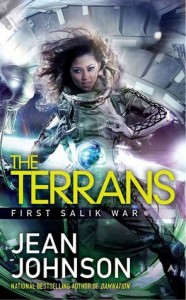 I started reading The Blockade almost as soon as I received the eARC. I absolutely adored the first book in the series,
I started reading The Blockade almost as soon as I received the eARC. I absolutely adored the first book in the series, 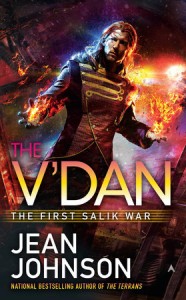 As established in The Terrans and The V’Dan, our heroes are a gestalt pair – they are bonded at the psychic level. While this was not intentional, more like an act of whatever gods one cares to blame, it is a fact in this universe. Gestalt pairs who are separated die.
As established in The Terrans and The V’Dan, our heroes are a gestalt pair – they are bonded at the psychic level. While this was not intentional, more like an act of whatever gods one cares to blame, it is a fact in this universe. Gestalt pairs who are separated die.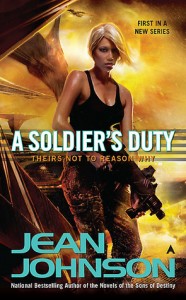 Not just because genocide is wrong, but because we have already seen the future, and the damned frogtopi are going to be needed. And if that statement intrigues you, and you haven’t yet read
Not just because genocide is wrong, but because we have already seen the future, and the damned frogtopi are going to be needed. And if that statement intrigues you, and you haven’t yet read 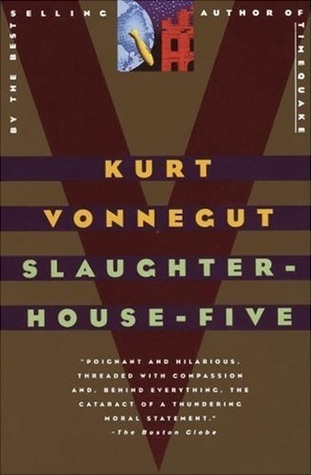 Slaughterhouse-Five by
Slaughterhouse-Five by 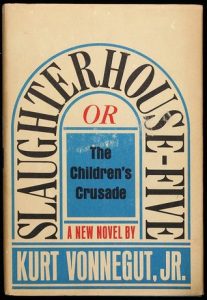
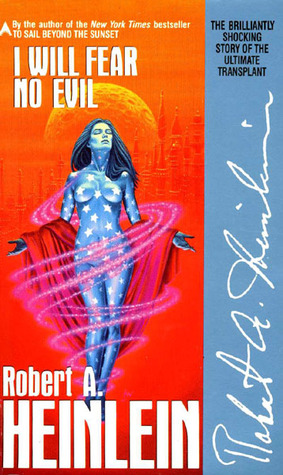 I Will Fear No Evil by
I Will Fear No Evil by 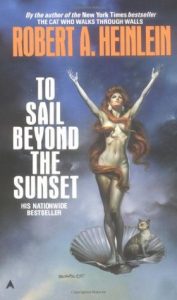 Robert Heinlein, often dubbed “the Dean of Science Fiction,” is a difficult author to review, in my opinion. My first exposure to Heinlein was
Robert Heinlein, often dubbed “the Dean of Science Fiction,” is a difficult author to review, in my opinion. My first exposure to Heinlein was  For an example of this, and as a glance at Heinlein’s commentary on society, take a look at
For an example of this, and as a glance at Heinlein’s commentary on society, take a look at 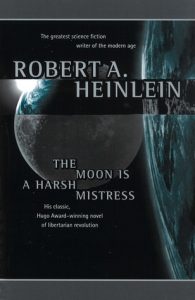 Marlene’s Note: A review of one of Heinlein’s works in singularly appropriate for this particular weekend. I will be at the World Science Fiction Convention in Kansas City, and Heinlein’s name will be invoked multiple times in multiple contexts. The context that would be nearest-and-dearest to his heart if he were still among us will be the
Marlene’s Note: A review of one of Heinlein’s works in singularly appropriate for this particular weekend. I will be at the World Science Fiction Convention in Kansas City, and Heinlein’s name will be invoked multiple times in multiple contexts. The context that would be nearest-and-dearest to his heart if he were still among us will be the 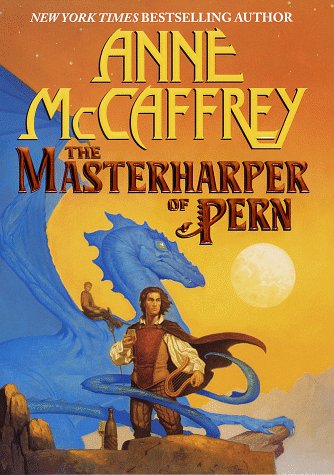 The MasterHarper of Pern by
The MasterHarper of Pern by 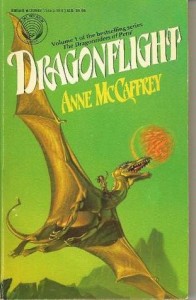 Most any Pern fan will tell you that the best way to read the series is
Most any Pern fan will tell you that the best way to read the series is  Escape Rating: A-. The great strength of this book, in my opinion, is that it ties together a great many loose threads from a whole bunch of other books. For instance, why did Petiron (yes, the same one) not communicate better with the MasterHarper in
Escape Rating: A-. The great strength of this book, in my opinion, is that it ties together a great many loose threads from a whole bunch of other books. For instance, why did Petiron (yes, the same one) not communicate better with the MasterHarper in 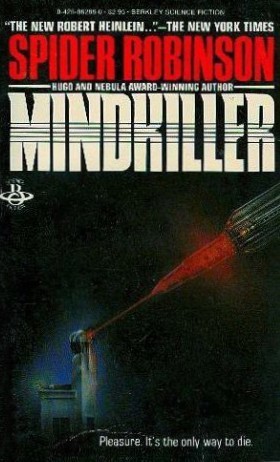 Mindkiller by
Mindkiller by 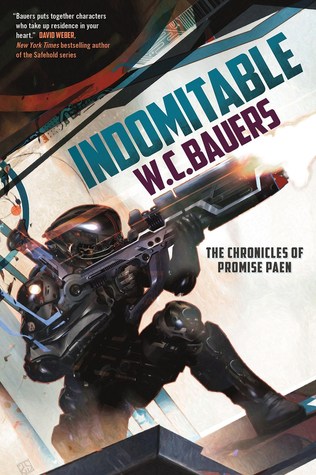 Indomitable (Chronicles of Promise Paen, #2) by
Indomitable (Chronicles of Promise Paen, #2) by 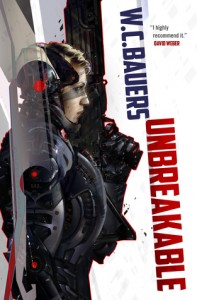
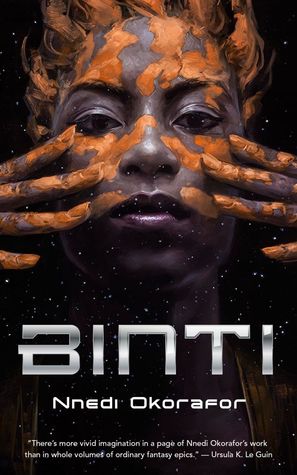 Binti (Binti, #1) by
Binti (Binti, #1) by 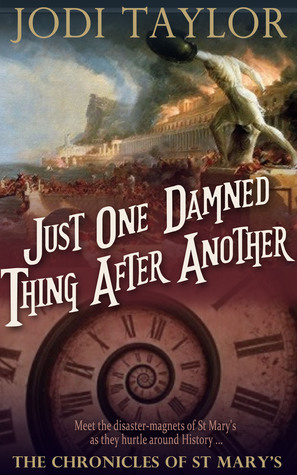 Just One Damned Thing After Another (The Chronicles of St. Mary’s, #1) by
Just One Damned Thing After Another (The Chronicles of St. Mary’s, #1) by  While Toynbee, quoting Hubbard, said that “History is just one damned thing after another”, there’s a not dissimilar quote from Oscar Wilde that also sums up this book. Wilde said that, “”Life is one fool thing after another where as love is two fool things after each other.”
While Toynbee, quoting Hubbard, said that “History is just one damned thing after another”, there’s a not dissimilar quote from Oscar Wilde that also sums up this book. Wilde said that, “”Life is one fool thing after another where as love is two fool things after each other.”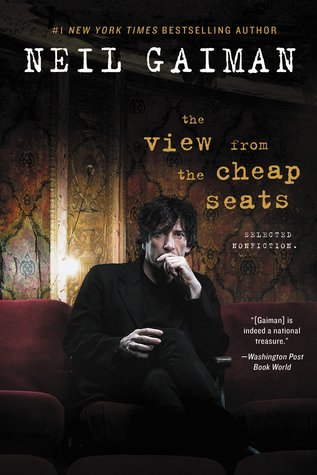 The View from the Cheap Seats: Selected Nonfiction by
The View from the Cheap Seats: Selected Nonfiction by 